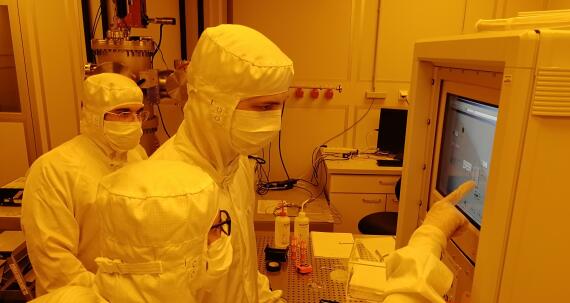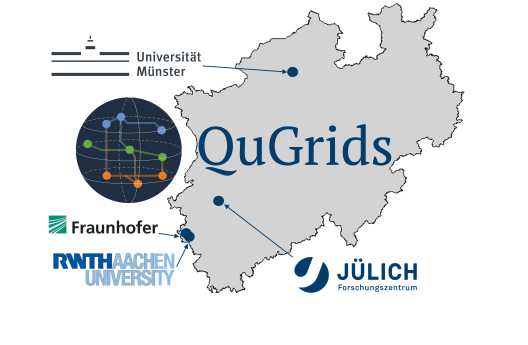

Running projects

© Qu-PIC QuPIC Project (Quantum Universal Photonics Integrated Circuit Platform)
The QuPIC project aims to develop a universal photonic integrated circuit (PIC) platform using Al2O3 technology to enable scalable quantum computing, communications, and sensing systems. By creating PIC building blocks, including light sources, single-photon detectors, and packaging and assembly technologies, QuPIC seeks to reduce the size, cost, and complexity of quantum devices. This European consortium brings together key academic and industry partners to establish a robust supply chain for photonic quantum technologies.
Project Information:
Academic partners: University of Twente, Ghent University, University of Münster, Chalmers University of Technology, Technische Universität Berlin, Physikalisch-Technische Bundesanstalt (PTB)
Industry partners: QuiX Quantum, Tematys, TOPTICA Photonics, TOPTICA EAGLEYARD, ALUVIA, VLC Photonics (Hitachi Group)
Funding: €5,947,868 (Grant Agreement ID: 101135845, funded under Digital, Industry, and Space (EU Contribution))
Duration: January 2024 – December 2027

© Fraunhofer IOF MANTIS
The MANTIS project aims to enhance the security of critical infrastructures, such as gas control systems, using measurement-device-independent quantum key distribution (MDI-QKD). By leveraging this advanced quantum technology, MANTIS seeks to prevent cyberattacks even if physical access to the detection systems is compromised, providing a robust solution for secure communication networks.
Project Information:
Consortium Coordinator: Fraunhofer IOF, Jena
Partners: Fraunhofer IIS (Dresden), Fraunhofer FIT (Sankt Augustin), PSI Software AG (Berlin), University of Münster
Funding: €5.11 million (with 86% funding by the German Federal Ministry of Education and Research, BMBF)
Duration: March 2024 - February 2027

© Schuck MultiQomm
The MultiQomm project, led by Pixel Photonics—a spin-off from the University of Münster’s Integrated Quantum Technology group under Prof. Dr. Carsten Schuck and the Responsive nanosystems group of Prof. Dr. Wolfram Pernice —aims to develop a scalable detector chip integrating various superconducting single-photon detectors. Utilizing the Münster Nanofabrication Facility (MNF), the project focuses on modular detector solutions for enhanced quantum key distribution (QKD) and industrial applications.
Project Information:
Consortium Coordinator: Pixel Photonics GmbH, Münster
Partners: University of Heidelberg, University of Münster (AG Schuck)
Funding: €2.33 million (with 88% funding by the German Federal Ministry of Education and Research, BMBF)
Duration: May 2023 - April 2026

© Schuck QuGrids
The QuGrids project was initiated on November 1st with partners Forschungszentrum Jülich (FZJ), RWTH Aachen, and Fraunhofer FIT. It aims to establish a profile in using quantum technologies to design, optimize, and secure energy grids for a sustainable future. Supported by generous funding from Minister Ina Brandes at the Ministry of Culture and Science of the State of North Rhine-Westphalia, this project marks a pivotal advancement in sustainable energy solutions.
Project Information:
Partners: Forschungszentrum Jülich (FZJ), RWTH Aachen, Fraunhofer FIT
Funding: Part of a €27 million allocation from the Ministry of Culture and Science of North Rhine-Westphalia (MKW NRW) for several projects
Duration: November 2023 - October 2026

© Uni MS CRC 1459 - Intelligent Matter
The CRC 1459 "Intelligent Matter" investigates whether synthetic materials can exhibit intelligent properties, defined as the ability to perceive information and adapt to changing environments. This could lead to new developments such as artificial skin, soft robotics with adaptive tactility, and brain-inspired computing with reduced energy consumption. In Research Area C, our group focuses on adaptive solid-state nanosystems. Led by Prof. Dr. Carsten Schuck and Prof. Dr. Benjamin Risse, our project (C05) works on the development of nanophotonic neural networks. By integrating nonlinear, photo-responsive systems with nanophotonic devices, we aim to create scalable AI components. Our research contributes to advancements in explainable AI and adaptive neural networks, supporting the exploration of intelligent matter technologies.
Project Information:
Coordinator: CRC 1459, University of Münster
Partners: University of Münster, interdisciplinary collaboration across multiple faculties
Funding: Part of the Collaborative Research Centre funding (DFG)
Duration: Ongoing research within a multi-phase framework aimed at developing prototypes of intelligent matter.

© European Commission SURQUID
The SURQUID project, "SUper-Resolving Quantum Imaging and Detection," is an ambitious Research and Innovation Action (RIA) funded under the Horizon 2020 Future and Emerging Technologies (FET-OPEN) program. Coordinated by the University of Münster, this project brings together experts from institutions like KTH Stockholm, FSU Jena, Fraunhofer IOF, IMEC, Swabian Instruments, and IBEO Automotive. SURQUID aims to surpass traditional limits in imaging and remote sensing by employing quantum technologies that enable super-resolution and super-sensitivity in LIDAR systems, integrating advanced quantum homodyne detection and non-classical light.
Project Information:
Coordinator: University of Münster
Partners: KTH Stockholm, FSU Jena, Fraunhofer Institute for Applied Optics and Precision Engineering IOF, IMEC, Swabian Instruments, IBEO Automotive
Funding: €3,759,480 entirely funded by the European Commission
Duration: October 2020 - March 2025
Former projects

© Pinkse & Schuck U Twente - WWU Münster Collaboration Grant
The U Twente - WWU Münster Collaboration Grant has been awarded to a joint project between Prof. Carsten Schuck from the University of Münster and Prof. Pepijn Pinkse at MESA+ and the Faculty of Science and Technology in Twente. Their project, "The Twente-Münster high-speed quantum key distribution link," focuses on establishing a new international Quantum Key Distribution Link using a dedicated glass fiber connection. This link utilizes advanced nanophotonic chips and superconducting nanowire single photon detectors to facilitate secure, high-speed quantum key exchanges, laying the groundwork for long-term cooperation in integrated quantum photonics and potential European consortia.
Project Information:
Coordinators: Prof. Carsten Schuck (University of Münster), Prof. Pepijn W.H. Pinkse (University of Twente)
Funding: Strategic Collaboration Grant from the Universities of Twente (UT) and Münster (WWU)
Duration: Ongoing with a strategic outlook for long-term collaboration and further European projects.

© IDP MiReQU
The MiReQu (Mixed Reality & Quantum Technology) project, developed by the University of Münster in collaboration with the University of Applied Sciences Hamburg, explores the integration of Mixed Reality technology to enhance laboratory experiments in quantum optics. Utilizing Microsoft HoloLens 2, the project aims to transform abstract quantum optical concepts into interactive, visual experiences, enhancing learning by linking theoretical models with real-time data from experiments. Funded by the Federal Ministry of Education and Research (BMBF), MiReQu seeks to develop and disseminate a validated teaching concept that could be applied to various educational levels, from university students to secondary school workshops.
Project Information:
Coordinators: University of Münster (including representatives from the Department for Quantum Technology and the Institute for Didactics of Physics), University of Applied Sciences Hamburg
Funding: Supported by the Federal Ministry of Education and Research (BMBF)
Scope: Development of educational experiments and Mixed-Reality environments for practical quantum optics education

© AG Schuck QuPad
The QuPad project, led by Prof. Dr. Wolfram Pernice and Prof. Dr. Carsten Schuck at the Westfälische Wilhelms-Universität Münster, was designed to develop nanochips for secure and efficient data transmission using quantum cryptographic techniques. Collaborating with PicoQuant in Berlin and Entropy in Munich, and funded by a €2.2 million grant from the Federal Ministry of Education and Research (BMBF), the project aimed to fabricate nanochips that could enhance data security against potential threats posed by quantum computers. A primary goal was to integrate ultra-sensitive nanowire detectors on nanophotonic circuits, aiming to improve encryption rates and speeds for advancing quantum key distribution (QKD) technologies.
Project Information:
Coordinator: Dr. Andreas Bülter, PicoQuant GmbH
Funding: €2.2 million (81.5% funding rate)
Duration: November 2018 – May 2021
Partners: PicoQuant GmbH (Berlin), WWU Münster (Physikalisches Institut, CeNTech), Entropy GmbH (Munich)
Funding
We are thankful to the following organizations for their generous support:

© EC 
© DFG 
© CS 
© BMBF
